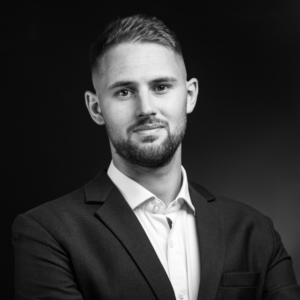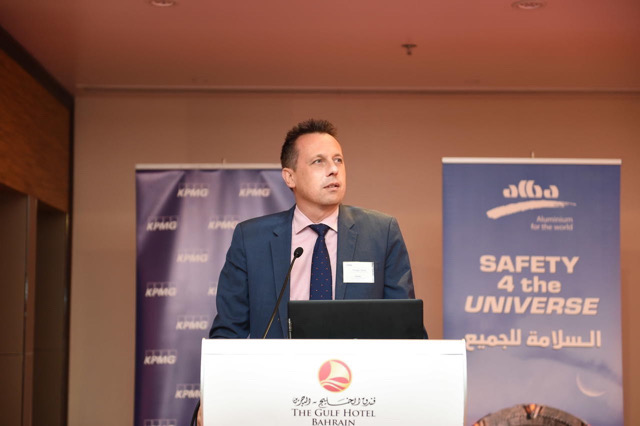Harvey John
Unit 2 Ferry Wharf
Hove Enterprise Centre
Basin Road North
Portslade, East Sussex
BN41 1BD
Time and time again, we’re asked by junior candidates what it takes to reach the senior grades within the indirect tax world. And rather than give you our answer, we thought it would be best if we shared the views of those who have been there and done it!
Philippe, thank you for allowing us to learn about your story and give us an inside look at your career. Before we dive in, could you tell us a little bit about yourself?
It’s a privilege to talk to you, and many thanks for this opportunity to share a few things from my professional journey. I was born in the centre of beautiful Belgium and had the chance to grow up in a warm family where the recipes delivered by my father made me the foodie I am nowadays.
After my Law studies and then obtaining my Master’s Degree in Tax Law, I started my first job at PricewaterhouseCoopers in Belgium. It was quite a different time and environment in the early 90s! After quite a few locations, I now enjoy the pretty amazing environment of the sunny Middle East.
From a foodie to Indirect tax – that’s nothing short of a journey! Where did your stint in Indirect tax start? Would you say you fell into the sector like most professionals in this field?
After my Law studies, I was looking to do something in criminal law or pick up a special scholarship programme in Germany. Still, PwC did invite me and some fellow students for drinks and posh nibbles one evening to meet and greet the partners and I remember that I was the last one to leave the party. I liked it and wrote them my only application letter at the time. I received a quick response and went for an interview, and the question came up if I was interested in starting in the small indirect tax team. My response of ‘why not, sure’ was the start of an amazing journey.
Sounds like you took a very open-minded route into indirect tax – quite the change from studying criminal law. Now that you’re well embedded into the sector, what’s life like being a Partner?
I’ll try to avoid the cliché answers. Let me say first that I might have left the tax consultancy profession if I had been working in other areas of tax. Indirect Tax and especially VAT is a tax that sits within the core of every business and allows my colleagues, team, and me to be true business advisors for our clients. As soon as you start thinking about buying or selling something or making an investment, it already has indirect tax implications.
Safe to say that you’re always involved in client projects then? This certainly must have an impact on your ability to have any sort of routine.
It’s everything but routine. Typically you try to plan your day ahead but at the end of the day, you’ve done 10 different things and met many people and clients. There’s always a need to understand the market and clients’ needs and ensure that I remain in a proactive state of mind. Especially in the Middle East, personal interaction and being a business advisor is of the utmost importance. I need to interact with all departments of a company up to delivering updates at Board meetings. That variety leads to continuously staying abreast with developments and adopting flexibility as a core professional skill. When the financial crisis hit in 2008, I was leading the Indirect Tax team at KPMG Hungary, and I set up the Indirect Tax Compliance Centre that is now the flagship of the KPMG Tax compliance offering it led to my current core focus in Tax technology, which is the foundation of my client delivery services.
Equally, if not more important, are my team and colleagues. I had the privilege and luck to have many great mentors in my life who tremendously helped me progress my career through technical and non-technical knowledge transfer. It’s not always easy but making time for people and adopting an open-door policy is always part of my day. And no worries, I do have a life outside of work where I love travelling (and as a partner, one can sometimes add a few days to a business trip abroad) and discovering new dishes and restaurants. The Middle East also allows me to swim off the calories regularly.
This sounds nothing short of a busy, yet rewarding schedule. This is something you have to earn. I’ve been told that progression in Big-4 settings can be challenging – would you say there’s anything in particular that you did to put yourself in your role at KPMG? Was there a certain skill, or attribute that you felt gave you the upper hand?
I can certainly understand that perception. In my case, I dare to say that flexibility, keeping my ears and eyes open and acting upon, or even creating my opportunities, have helped me progress. My professional journey started away from Belgium by agreeing to have a drink with Tony McClenaghan, then Deloitte’s Global Indirect Tax Leader, who had the ambition to exponentially develop the Global network. I took a sip of my drink and asked him if he would be looking for a person who would do the groundwork and we parted with me having a Global job. Your initiative and understanding of the opportunities, I believe is what will always come your way at whatever stage of your career.
I can agree that it’s certainly the mindset all professionals should adopt if they want to further their careers. Staying proactive and educating are two very underrated things. Nowadays, professionals at your level encourage proactivity in learning – are you active in self-education? How often do you gather your knowledge?
Now, we talk indeed about the challenge of time. Often, it’s very tempting to just plant yourself on the couch in the evening. Don’t get me wrong, I do switch off as much as I can after a work day. However, you must develop a certain routine and make sure you read the new legislation – whereby my law background does help me understand what I’m reading. I make sure I cover new decisions and several articles a month. Thanks to my assistant, who also handles knowledge gathering, I get these ready to absorb and I find 30 to 60 minutes a day for knowledge gathering and sharing. It goes broader and learning on the job is essential whereby I’m very grateful for my very good memory. Reading the economic news, and broader regional and world news means I’m not taken by surprise in business meetings. I love to provide training to my team and in other events and seminars, so getting my knowledge up to date is essential and there’s no excuse as we now have a tremendous amount of online resources to get it done.
I know we’ve already touched on the idea of daily routines – well, lack thereof. Are you able to keep a routine, or are there too many moving parts?
As I said, it’s almost impossible for me to have a daily routine at work but there are a few routine habits that I stick to. Starting with a cup of coffee in the morning before the daily shower where I read the news updates and skim through the Belgian newspaper. When I get to the office – which can be late if I start my day with meetings – I go around the office and check up with my team, catch up with my assistant and have a discussion with my Director. Before leaving the office in the evening, I prepare for the next day’s meetings so I can switch off after that. One routine I sometimes fail to stick to is the 7 am gym workouts!
We’re all guilty of that! Aside from your routine, have there been any key working habits that you’ve adopted since you’ve been a Partner?
The habits that I mentioned already, or maybe call them acquired ‘soft skills’. Flexibility and willingness to step outside of your comfort zone. Indirect Tax consulting isn’t just about reading a legal article and emailing it (fax when I started work) to a client. Building a foundation is all about gathering and understanding all facts – having these is 90% of the work done. And above all, it’s about continuously learning and evolving. I’m a lawyer by education, but I never came across any subject with the word ‘technology’ in it. Yet today, one of my specialisms is Tax Technology as this enables the whole spectrum of my job.
With that being said, what key advice would you give to anyone who wants to drive their careers deeper into leadership roles?
Own your career development. It’s not wrong to move roles but never leave with an unfinished job. Above all, be open and always transparent in your dealings with colleagues at all levels and be honest with clients and all stakeholders in your professional life. Only then can you be a trusted professional. And yes, understand how to sometimes be a good politician.
What are your top 5 habits in your professional life and how can one adapt these to their day-to-day lives?
Not easy to list just like that, but I’ll give it a go:
- Have fun. I want to laugh and joke at work – Not to the detriment of anyone but a good mood makes a world of difference and allows stress to be under control.
- Learn something new or do something different at least once a week.
- Don’t just take, but give more than you take. I love community service and it gives me a lot of satisfaction.
- I know that everyone has a role and contributes in different ways and when I come across people outside the office, all of them deserve respect and then you’ll get respect and gratitude back.
Put you on the spot, but Top 4 works too. What are your next career aspirations, and who inspires you?
This may sound funny but I want to conclude my active working life one day as the proud owner of a Bed & Breakfast – with dinner options in the evening so I can cook for guests. Until then, I keep looking forward to learning and developing and I want to leave a very strong legacy with KPMG in Bahrain when, one day, I leave.
In terms of my inspirations – I’ve come across many amazing professionals in my life and have been privileged to learn from them. I’d never be where I am now without support from others. I mentioned Tony McClenaghan at Deloitte who undoubtedly gave my career my international direction. The KPMG Bahrain managing partner, Jamal Fakhro amazes and inspires me every day with his deep business understanding and his unconditional support for his people. I have the utmost respect for Ramona Jurubita who I got to know when we were both indirect tax managers and who now is the Sr Partner at KPMG in Romania.
What are your recommended reads or inspiring books you’ve come across recently?
Two that I very recently read and very much enjoyed.
Surrounded by Idiots by Thomas Erikson. A very different take on how to understand people and how to interact with them. The title alone is eye-catching and I kept it for a few days on my office desk.
Death by Meeting by Patrick Lencioni. The biggest compliment I got last month was a client telling me that he finally had an efficient meeting. Every week some meetings aspire to be the most painful problem in business and this book so well illustrates that – whilst also trying to give solutions.
Philippe, it’s been an absolute pleasure. Thank you for taking some time to take us through your journey. Nothing short of an inspiration.
Are you at the senior level within Indirect Tax? If so, we’d love to hear about your experiences and share them with our global tax network.
Search our latest tax jobs.
If you would like to see our company updates and industry insights, follow our LinkedIn page.
Author

From boutiques to the Big 4, and start-ups to multinational corporations, Alex manages a diverse portfolio of clients worldwide which has enabled him to develop a vast global network of indirect tax and tax technology professionals in 40+ countries.







